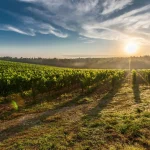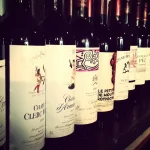In the excellent purple pages on her website, Jancis Robinson (a known riesling admirer) says, “’Reece-ling’ must be the world’s most misunderstood, and mispronounced, grape variety”.
To that, my personal addition would be “and under-appreciated” but purple pages suggests that historically that may partly be because some of the riesling Germany exported here last century did “nothing for the reputation of their greatest asset”.
Happily, those days are long past and modern wines from Germany are frequently superb (and, remember, currently 40% of them are red).
Better still, you needn’t ascend too far up the price ladder before you start to encounter real quality – today’s selection, for instance, starts from about £13.
Wine made to this standard almost anywhere else would be significantly more expensive.
To give MidWeekers, the “heads up” on what’s drinking well, I asked Iris Ellmann of German specialists The WineBarn to give us some pointers on what to buy this summer.
The Best German Rieslings to Try this Summer
Of all the German grape varieties, none is more synonymous with fine German wine, than the noble Riesling.
A true favourite of wine drinkers the world over, a good Riesling wine is elegant, rich in character, high in natural fruit notes and has a racy freshness.
Expressive of its terroir and aging exceptionally well, Riesling is traditionally used to make sweet wine but its versatility means it is now commonly used to make dry and sparkling white wines.
Riesling originated in the heart of the Rhine valley and was first documented in 1435, in a cellar log from Germany’s small Hessische Bergstrasse wine region, south-east of Rheingau.
Due to its surge in popularity Riesling is now the country’s premier grape variety, accounting for a fifth of all plantings and is grown across all the winemaking regions of Germany.
There is an abundance of choice when it comes to Rieslings, particularly with so many wines available to buy online, but not all Rieslings are created equal.
So, here, The WineBarn’s MD Iris Ellmann recommends her favourite Rieslings to enjoy this summer. Click on the heading to go to the supplier’s website
Bassermann-Jordan – 2018 Estate Riesling QbA Dry

The Wine: This dry Riesling is light and easy on the palate – perfectly balancing fine acidity with minerality and delivering an excellent finish. On the nose it has vibrant aromas of apple, peach and exotic fruits. This is fresh, young Riesling.
The Origin: The estate wine is made from grapes grown in the vineyards of Ruppertsberg, Frost, and Deidesheim, in the Pfalz region of Germany. There, the soil is rich in loam, clay, rocky sandstone, basalt and limestone, giving the wine its distinctive minerality. The grapes were hand picked in early October, then gently pressed. The must settled for 24 hours, then fermentation took place in stainless steel vats.
Food Pairing: This white wine pairs perfectly with citrusy lemon chicken or mushroom & spinach risotto.
Editor’s Note: See my thoughts on this wine (and one other) at the foot of this piece
Clemens Busch – 2014 Red Slate Riesling QbA Dry
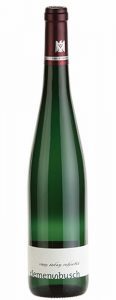
The Wine: The 2014 Red Slate Riesling or ‘Riesling Vom Roten Schiefer’ is a certified organic and biodynamic wine with herbal notes that complement its intense flavours of grapefruit and spice. A powerful yet elegant wine, it is harmoniously balanced with a fine acidity.
Origin: This dry Riesling is produced from the fruit of Clemens Busch’s Marienburg vineyard, which is one of the best sites in Mosel region, due to its weathered red slate soils and steep south/south-east facing slopes.
Winemaking Philosophy: In 1984, Clemens and his wife Rita, decided to convert to sustainable, organic viniculture out of their deep respect for the environment. In practice, this has meant a commitment to intense manual labour – working the vineyards by hand, using biological diversity to protect the vines naturally and without the use of any synthetic pesticides, herbicides or chemical fertilisers. The result is soil that is full of vitality and deep-rooted vines that deliver healthy, high quality fruit.
Food Pairing: This Riesling is the perfect companion to light dishes such as a salmon steak or chicken with salad.
K. F. Groebe – 2017 Riesling *1763*
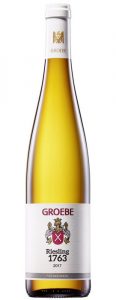
The Wine: Refreshing and elegant, this is a classic Riesling. Bursting with intense fruit flavours and full of character, it is an absolute pleasure to drink.
Origin: The wine’s name recalls the year the winery was founded. These centuries-old vineyards in Westhofen, Rheinhessen have been cared for by the generations of the Groebe family. This vineyard is classified by the VDP (an association of which only Germany’s most elite winemakers are members) as a Grosse Lage site. This is the highest classification that can be achieved based on the wine’s quality, uniqueness and the distinctiveness derived from its origin.
The south-east facing slopes on which the grapes for this wine were grown has a loess loam and clay top layer with sand beneath.
Winemaking Philosophy: Groebe manage their vineyards sustainably using natural vegetation to promote the growth of the vines and without the use of herbicides, insecticides or mineral fertilisers. The grapes were harvested by hand in early October, then gently pressed. Using traditional methods, the wine was cold-fermented and vinified in oak barrels.
Food Pairing: The ideal accompaniment to a variety of dishes, particularly spicy Asian cuisine.
Allendorf – 2015 Winkler Riesling QbA Dry
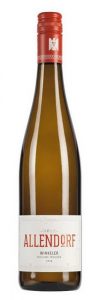
The Wine: A moderately heavy wine it is robust and mature, yet not too intense. Its playful fruitiness, minerality and fine acidity, combine to give this Riesling its lively character. It delights on the palate with ripe, fruity-sweet apple, apricot and peach flavours and has enticing aromas of citrus and fresh chervil.
Origin: The southerly facing vineyards, near the river Rhine on which the grapes for this Riesling were grown, have deep calcareous loess soil.
Winemaking Philosophy: As a VDP member, Allendorf proudly own 70 hectares of some of the best vineyards in Winkel, Rüdesheim and Assmannshausen. The Allendorf family’s focus is on producing wines that reflect their terroir and are typical of Rheingau region. As this wine is from the Winkel site, it is characterised by loess and loam soil found there.
Food Pairing: This Riesling is well-suited to fried fish, veal and shellfish. creamy pasta dishes such as spaghetti carbonara.
While many of the larger wine companies have ceased deliveries, supermarket wine supplies are running low and you have the chance to avoid the queues, why not stay safe during the pandemic and let The WineBarn deliver wine to your door?
As one of the best places to buy wine online, they can deliver it to your home within 2 to 3 days.
Iris is also happy to offer personal recommendations and advice of wine selection. To discuss your wine requirements, please email: iris@thewinebarn.co.uk or call 01962 761 215.
The MidWeek Wines View
I particularly enjoyed the softness and aromatics of 2018 Bassermann Jordan Riesling Trocken (a mere 12% abv) which worked well with its textured mango and red apple fruit and prickle of acidic freshness.

The other Wine Barn option (not included above) was another modest alcohol (11.5%) trocken but from an area not seen so often in the UK – Württemberg near Stuttgart – and from a producer (Aldinger) that The World Atlas of Wine singles out for a special mention.
Zingy with a discernible sense of purity, 2018 Rebhuhn Riesling Trocken centres around a grapefruit backbone enlivened by lemon and lime acidity and supported by hints of white pepper, ginger and minerals.
Back on Monday folks with our usual round up of offers about to start and a couple of recommendations for you to savour.





